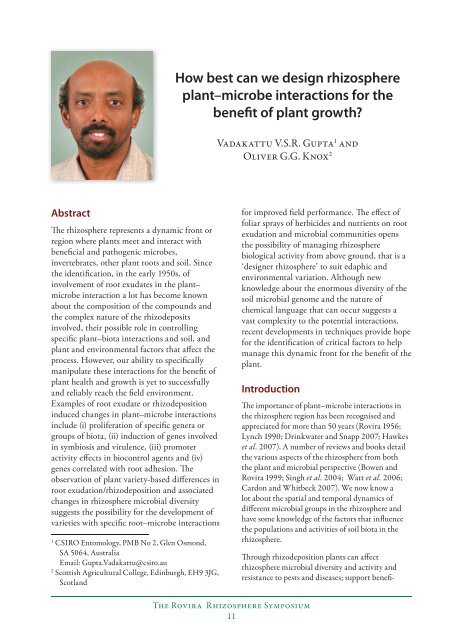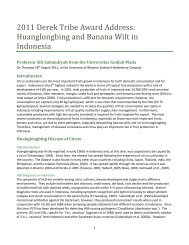Rovira Rhizosphere Symposium - The Crawford Fund
Rovira Rhizosphere Symposium - The Crawford Fund
Rovira Rhizosphere Symposium - The Crawford Fund
You also want an ePaper? Increase the reach of your titles
YUMPU automatically turns print PDFs into web optimized ePapers that Google loves.
Abstract<br />
Th e rhizosphere represents a dynamic front or<br />
region where plants meet and interact with<br />
benefi cial and pathogenic microbes,<br />
invertebrates, other plant roots and soil. Since<br />
the identifi cation, in the early 1950s, of<br />
involvement of root exudates in the plant–<br />
microbe interaction a lot has become known<br />
about the composition of the compounds and<br />
the complex nature of the rhizodeposits<br />
involved, their possible role in controlling<br />
specifi c plant–biota interactions and soil, and<br />
plant and environmental factors that aff ect the<br />
process. However, our ability to specifi cally<br />
manipulate these interactions for the benefi t of<br />
plant health and growth is yet to successfully<br />
and reliably reach the fi eld environment.<br />
Examples of root exudate or rhizodeposition<br />
induced changes in plant–microbe interactions<br />
include (i) proliferation of specifi c genera or<br />
groups of biota, (ii) induction of genes involved<br />
in symbiosis and virulence, (iii) promoter<br />
activity eff ects in biocontrol agents and (iv)<br />
genes correlated with root adhesion. Th e<br />
observation of plant variety-based diff erences in<br />
root exudation/rhizodeposition and associated<br />
changes in rhizosphere microbial diversity<br />
suggests the possibility for the development of<br />
varieties with specifi c root–microbe interactions<br />
1 CSIRO Entomology, PMB No 2, Glen Osmond,<br />
SA 5064, Australia<br />
Email: Gupta.Vadakattu@csiro.au<br />
2 Scottish Agricultural College, Edinburgh, EH9 3JG,<br />
Scotland<br />
How best can we design rhizosphere<br />
plant–microbe interactions for the<br />
benefi t of plant growth?<br />
Vadakattu V.S.R. Gupta 1 and<br />
Oliver G.G. Knox 2<br />
<strong>The</strong> T <strong>Rovira</strong> R <strong>Rhizosphere</strong> R <strong>Symposium</strong><br />
S<br />
11<br />
for improved fi eld performance. Th e eff ect of<br />
foliar sprays of herbicides and nutrients on root<br />
exudation and microbial communities opens<br />
the possibility of managing rhizosphere<br />
biological activity from above ground, that is a<br />
‘designer rhizosphere’ to suit edaphic and<br />
environmental variation. Although new<br />
knowledge about the enormous diversity of the<br />
soil microbial genome and the nature of<br />
chemical language that can occur suggests a<br />
vast complexity to the potential interactions,<br />
recent developments in techniques provide hope<br />
for the identifi cation of critical factors to help<br />
manage this dynamic front for the benefi t of the<br />
plant.<br />
Introduction<br />
Th e importance of plant–microbe interactions in<br />
the rhizosphere region has been recognised and<br />
appreciated for more than 50 years (<strong>Rovira</strong> 1956;<br />
Lynch 1990; Drinkwater and Snapp 2007; Hawkes<br />
et al. 2007). A number of reviews and books detail<br />
the various aspects of the rhizosphere from both<br />
the plant and microbial perspective (Bowen and<br />
<strong>Rovira</strong> 1999; Singh et al. 2004; Watt et al. 2006;<br />
Cardon and Whitbeck 2007). We now know a<br />
lot about the spatial and temporal dynamics of<br />
diff erent microbial groups in the rhizosphere and<br />
have some knowledge of the factors that infl uence<br />
the populations and activities of soil biota in the<br />
rhizosphere.<br />
Th rough rhizodeposition plants can aff ect<br />
rhizosphere microbial diversity and activity and<br />
resistance to pests and diseases; support benefi -



